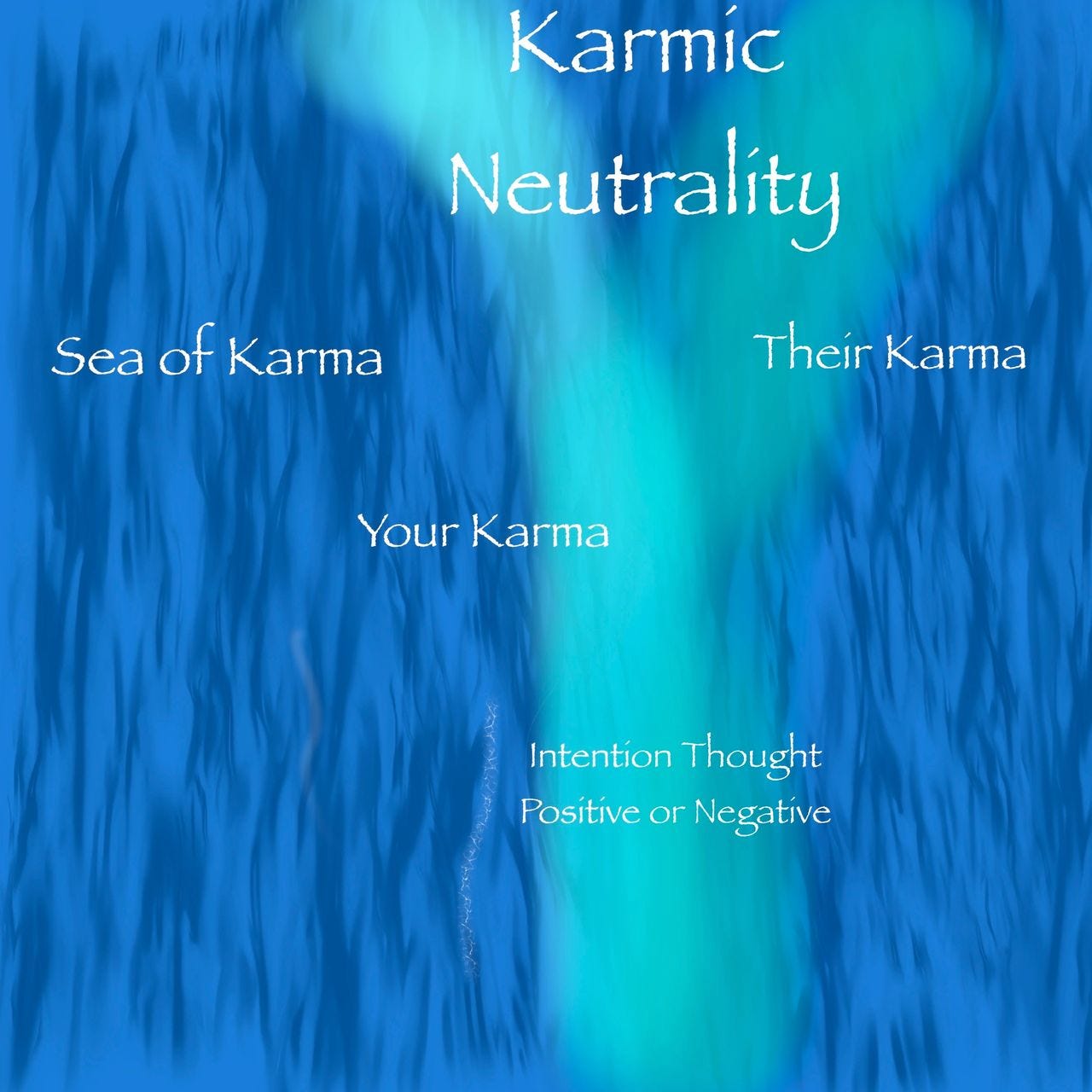Karmic Neutrality for Codependency
Karmic Neutrality
To
Manage Codependency
Introduction
This will help you clear your mind and make better life and career decisions. Too many of my decisions were influenced by negative codependency. I hope this helps you deal with them before they cause you trouble.
Karmic Neutrality occurs when intention is removed from a relationship. This ends all karma affecting actions. The relationship is over forever.
This article will use the Buddhist definition of karma. It is based upon the concept of cause and effect. This is the basic definition of karma:
“karma refers to actions driven by intention (cetanā), a deed done deliberately through body, speech or mind, which leads to future consequences. “
There is no moral judgement of actions and consequences. Karma is not punishment or reward. Karma is consequences. The following link goes into great detail about the Buddhist conception of karma.
https://www.namchak.org/community/blog/karma-in-buddhism/
Karmic Neutrality and Codependency
Karmic Neutrality is eliminating positive and negative thoughts about the other person from your mind. You do not wish them well or ill. You take no pleasure in their success or failure. Their fate is left to their karma. Karmic Neutrality frees you from habitual intentions that create actions and consequences.
This method is especially useful for terminating codependent relationships.
Chat GPT defines codependency as follows:
“ is a behavioral and psychological condition where individuals excessively rely on others for approval, validation, and a sense of self-worth. It often involves an unhealthy, one-sided relationship dynamic where one person prioritizes the needs of others over their own, to the detriment of their own well-being. Codependent individuals may have difficulty setting boundaries, making decisions independently, and expressing their own feelings and needs. This pattern of behavior can occur in various types of relationships, including romantic, familial, and friendships.”
Codependency makes you feel trapped. You are not happy with the relationship, but for some reason you cannot let it go. The relationship could be a love affair, business partnership, friendship or even with an organization. The common underlying feeling is that you keep doing things for your codependent partner that cause you anguish. Yet you continue to do them, usually out of a feeling of guilt.
Codependency causes resentment, anger, and often a feeling of hopelessness. This can create bitter arguments with your codependent while hating them for the way they you feel. The resulting remorse reinforces the bonds of guilt that tie the relationship together.
At a certain point, I would find that I had had enough. The relationship had become too emotionally costly. The ending of the relationship usually left me thirsty for revenge and hoping that the other person failed miserably in life. It required this level of emotionality to develop the strength to end the relationship.
However, if I held onto these negative feelings, then I was still in the relationship. If I tried positive feelings, then I was still in the relationship. Both situations open doors into my psyche that continued the relationship whether I wanted it to or not. Freedom from the relationship requires neutrality and distance.
Of course, this is easier said than done. Codependency is very strong and is integrated into your neurology. It is an addiction. It always keeps trying to find way back into your life. It is fulfilling an unhealthy and hidden need. This need creates cravings for codependent emotional conditions. However, like drugs, these conditions eventually eat away at your psyche, and make your life uncomfortable and difficult. Your decision-making is clouded, and you end up in difficult situations time and time again.
Karmic Neutrality is a tool to stop the addiction to a codependent relationship. It does not immediately deal with the underlying conditions that create the need for codependency. Also, again like addiction, you need to recognize how powerless you are over the codependent relationship and its negative consequences on your life.
Karmic Neutrally enables you to stop having intentional thought about the other person in the codependent relationship. Intentional thought leads to action and then to consequences. Codependent consequences have negative impact on your life. It does not matter if your thoughts are positive or negative. Intentions have consequences and they keep you in tangled and the other person’s karma.
Freedom
Achieving karmic neutrality is not easy. Codependency is neurologically wired into your brain. It creates a loop that is triggered by external stimuli. Once the loop is triggered, you have to deal with a plethora of thoughts concerning your codependent. This reignites the negative codependent emotions.
Karmic Neutrality ends the codependent relationship. There are therapies to transform codependency into a healthy relationship. However, Karmic Neutrality is for terminating the codependency and completely ending the relationship.
The beginning involves recognizing that the relationship is codependent in the first place. Then you have to determine if the codependent relationship is worth trying to transform or that it’s so toxic it needs to be ended totally. Once you determine the toxicity of the relationship, you need to begin to remove yourself from the most toxic relationships.
This starts by ending all contact with your codependent partner. This includes text, email, phone and in person communication. You should also eliminate them from all of your social media platforms as much as possible. The purpose is to eliminate codependent triggers.
The truly difficult part is eliminate them from your thoughts. Remember, codependent relationship is addictive by its very nature. Therefore, the addictive neurology in your mind will continue to throw thoughts at you. These thoughts can trigger a variety of emotions, including guilt and the desire to repair the relationship or leave it on a positive note. None of these are good.
I have found that the best way to handle this is to try to create distance between the thought and your reaction to the thought. For example, if you feel like you should say something to make the person feel better or to alleviate their perceived suffering, the best thing to do is wait until you act upon that thought. Try to remember the consequences of the relationship and leave their problems to them or wish that whatever spiritual entity that you believe in handles these issues. 12 step programs call this turning them over to their higher power. In a 12 step program, you basically pray that God’s will be done in their life. This puts God in place of the intention instead of yourself. This is one method to help remove yourself from the intentionality of the relationship.
The purpose of karmic neutrality is to remove all intentional thoughts from the relationship. Your wishing positive or negative feelings towards the other person is intentional thought. These intentional thoughts impact yours and their karma. This re-entangles you into a toxic situation. Codependent relationships are very deep, and these thoughts can trigger an ocean of emotions that are difficult to control and will drown you and negative emotions.
As time progresses, you will begin to dismiss these thoughts as soon as they occur. This means immediately redirecting your attention to anything other than these thoughts. You train your brain to diminish the frequency in the strength of the thoughts that the addictive neurology sends your way. Eventually, you should be able to overwrite this neurology and no longer be plagued by the toxicity of the relationship.
Karmic neutrality is a tool to remove you from the toxicity of the relationship. Even if you do not believe in karma, it gives you way to become neutral about the other person. This relieves you from the ongoing emotional stress that occurs in a codependent relationship. It is no substitute for therapy and other clinical interventions that can deal with the root cause of codependency. However, it can give you relief from the symptoms while you are trying to deal with the underlying cause.





